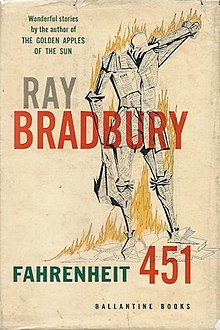Ray Bradbury’s novel is one of those decades old stories that remains so relevant in our modern world, it’s almost as if the author travelled forward in time and saw our future. A powerful commentary on human social behavior and attitude, Fahrenheit 451 is enduring, provocative and insightful.
Bradbury’s novel is set in American in a dystopian future, and follows the day to day activities of a fireman named Guy Montag. Guy lives in a time where individual thought is seen as something that can destroy peace and ruin happiness. Books are burned, free thinkers are arrested and everyone lives a vapid, mindless existence. One evening Guy returns home to find that his wife has tried to commit suicide. The EMT’s who pump her stomach are indifferent to this, they do this all the time. Guy is shocked at how little they care. Not caring is a thing in this world. His wife doesn’t care about anything but her house and her parlor wall “family,” a series of TV screens that she can watch at the same time. One person who does care is Guy’s new neighbor Clarisse. She is a teenage girl whose curiosity has made her an outcast and she is having therapy due to her “troubling thoughts.” Every evening she meets Guy on his way home from work, talking to him all the time.
One day she doesn’t show up and Guy starts to suspect that something is wrong. Guy becomes disillusioned with the status quo following an evening at work during which an old lady commits suicide, rather than stand by and watch her books burn and her livelihood disappear. Her suicide, and his sneaky theft of a book while he was there, causes Guy to fill ill and take the next day off. His boss is suspicious and tells our fireman about the history of firemen and why burning books became necessary. He warns Guy that he has 24 hours to burn the book.. or else. So threatening, because this could literally be a life or death choice, such is the price of knowledge. This is where we discover has a curiosity, one that he has been trying to hide from for some time but cannot any more. His frustration, confusion and dissatisfaction with society are revealed and Guy becomes convinced that “dangerous” and “outlawed” thoughts might be the one thing society needs in order to survive.
It’s impossible to grab this book without knowing what it is about. Dystopian and book burning. You go into it thinking that it is going to be similar to Total Recall with a beefy main character, all of the action and a really poignant message that hits the nail on the head. To be honest, that’s half true. The message of the book is clear throughout the novel. In fact, it’s so hard to miss because it’s forced down your throat. People are simple, shallow and vain. We don’t want to make effort. We don’t want to care. People that do care make us feel bad about ourselves so nobody should be allowed to care about anything. It’s a message that is so relevant today. It’s a bit of a fear provoking novel to think that this is a future that is entirely possible due to the way the media display and manipulate truths and things are summarized in order to make things easier for people to understand.
The characters are accurate representations of people you meet day to day, and in a similar quantity. Hard working men with simple pleasures. Simple women focused on other people. There are few people like Clarisse, a character with infectious curiosity, warmth and depth. She is the character that forces us to open our eyes and see past the status quo and it is her disappearance that really shows us how corrupt this society can really be. Accurate, considering some of the icons of our modern time.
Bradbury uses quotes from literature throughout the novel in order for his characters to make a point. This is especially effective when the fire chief is having a conversation and his words are littered with quotes from popular literature, showing us that he has broken the law for years and he is an educated man. Even so, he is no different from the others as he keeps the status quo alive by choosing to follow laws he knows made no sense. Poignant and accurate, though maybe a bit flowery in it’s delivery for some tastes.






